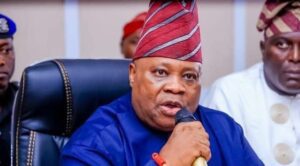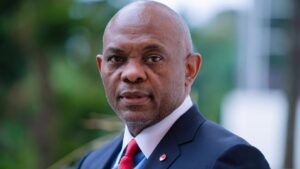Market dominance: How BUA-Dangote feud threatens investors confidence, calls for stronger anti-competition laws
…Dangote denies allegations of $3.4bn money laundering, forex scam
…BUA recounts over 30 years running battle with Dangote
By Sodiq Adelakun
The ongoing feud between BUA Group and Dangote Industries Limited (DIL), Nigerian NewsDirect has gathered, threatens the confidence reposed by investors in investing in Nigeria and the growth of Small medium enterprises in Nigeria.
Recall that President Bola Tinubu had in a meeting with Gopichand Hinduja, Chairperson of the Hinduja group of companies in India and in a spectate business meeting with leading Business leaders assured that Nigeria will become one of the “most conducive places on earth” for foreign investments.
The President had declared that he would ensure that bottlenecks are removed and investors thrive in the country. However, the ongoing feud between Dangote Industries Limited and BUA Group along with the shocking revelations made by both parties may undermine the President’s hope of boosting Nigeria’s economic fortunes.
A report by the Organization for Economic Co-operation and Development (OECD) titled Foreign Direct Investment for Development outlines how policies that do not tackle monopoly and anti-competition affects the flow of Foreign Direct Investments into a country.
The report stated that some of the factors holding back FDI include the perceived sustainability of national economic policies, poor quality of public services and closed trade regimes.
“Even where the obstacles to FDI do not seem insurmountable, investors may have powerful incentives to adopt a wait-and-see attitude. FDI (and especially greenfield investment) contains an important irreversible element, so where investors’ risk perception is heightened the inducement would have to be massive to make them undertake FDI as opposed to deferring their decision.”
Moreso, research globally has shown that nations where the anti-competition policies are not strong enough and there is a perceived monopoly discourage investment from investors.
In Nigeria, the Federal Competition and Consumer Protection Act 2018 (the Act) is the main anti-competition law in Nigeria.
The Act establishes the Federal Competition and Consumer Protection Commission (FCCPC) as the regulatory body.
The FCCPC has far-reaching powers including the power to enter and search premises, summon and examine witnesses, call for and examine documents, and do such other things as it considers necessary for the effective performance of its functions.
The Act further empowers the commission to check abuse by a company with a dominant position in a market.
“A company is said to abuse its dominant position where it charges an excessive price; refuses to give a competitor access to an essential facility when it is economically feasible to do so; and engages in an exclusionary act unless it can show that the technological efficiency and other pro-competitive gains outweighs the anti-competitive effect,” noted Ozi Nwadike, a legal expert at Pristine and Sage Attorney.
There is also a penalty for flouting the rule.
“The punishment for contravention is a fine not less than 10 percent of its turnover in the preceding business year or such higher percentage as the court may determine under the circumstances of the particular case,” said Nwadike.
However applying these rules to politically-connected persons have been a tad difficult. A critical examination of the claims and counterclaims by both BUA and Dangote indicate efforts to influence government officials to give aid or undermine a rival.
He further said in a post on social media, “As these two men fight, they are sending the wrong messages to the world on some of these critical sectors: how fast a president or a minister could pick your call is what really matters, and not the ideas you are bringing to the market.”
Reactions from Nigerians on social media
A X user @im_owolatop, said, “The Dangote vs. BUA situation underscores a crucial point: business monopolies can be detrimental, particularly in a country like Nigeria. Although Dangote may not be pleased with BUA’s recent price reductions, it’s undoubtedly in the best interest of Nigerians.”
@AbangMercy said: “The necessity for an economy that fosters a larger number of entrepreneurs, rather than one that is exclusively accessible to acquaintances of Aso Villa occupants, is exemplified by the confrontation between BUA and Dangote. These individuals contribute to crony capitalism.”
Another X user said, “Good People, I have read Dangote Group’s accusations against BUA Group and the high-voltage response from the BUA Group. In summary, Nigeria has a long way to go. From these public crusades, we can get one thing: it is not the best idea that wins in Nigeria in these traditional industries, but the idea with the best “connections.
“In other words, there is no way you can operate in these industries without selling your soul to politicians since they hold the powers to advance or cut you off. As these two men fight, they are sending the wrong messages to the world on some of these critical sectors: how fast a president or a minister could pick your call is what really matters, and not the ideas you are bringing to the market.
“That must change, and necessarily must change. Click for the documents (in PDF); a good business student has some nice documents for a final year seminar on business strategy in Nigeria!” Ndubuisi Ekewe, a professor and head of Tekedia Institute, a business management outfit.
JJ Omojuwa on his X page also lamented saying: “Reading that BUA letter, it was sad reading how the power of the state was being used to bully a billionaire. What then happens to everyday Nigerians? Clearly, that anomaly isn’t exclusive to billionaire battles. It is really just too easy to use the tools of state for personal agendas. Shouldn’t be.”
The big issue
BUA Group, a prominent Nigerian conglomerate, recently responded to allegations made by its rival, Dangote Group, regarding a supposed malicious media campaign.
The two companies have been competing in the cement and sugar sectors, with Dangote Group accusing BUA Group of disguising itself as a concerned citizen to spread false information.
However, BUA Group has fired back, stating that it has been aware of Dangote Group’s attempts to push it out of business for some time.
The ongoing feud between the two companies has been a topic of interest in Nigeria’s business community.
BUA Group has been a major player in the country’s economy for decades, with interests in a variety of sectors, including cement, sugar, and oil.
Dangote Group, meanwhile, has become one of the largest conglomerates in Africa, with a focus on cement, sugar, and other commodities.
The recent accusations made by Dangote Group against BUA Group have sparked a heated debate in the media. Dangote Group has accused BUA Group of spreading false information about its operations, while BUA Group has accused Dangote Group of engaging in underhanded tactics to undermine its business.
Despite the allegations, both companies have continued to operate and expand their operations in Nigeria. BUA Group recently announced plans to build a new cement plant in the country, while Dangote Group has been expanding its sugar operations.
Dangote Group, in a statement titled “Economic Sabotage: Our Stand,” has refuted claims of being investigated for alleged illegal foreign exchange deals and money laundering amounting to $3.4 billion.
The company dismissed the report as a rehash of a similar allegation made in 2016 by an individual operating under the guise of a concerned Nigerian.
According to the statement, Dangote Industries Limited has been falsely accused of involvement in illegal foreign exchange laundering during the tenure of former Governor of the Central Bank of Nigeria, Godwin Emefiele.
The company vehemently denies these allegations and asserts that they are baseless and unfounded.
The company emphasised that it operates with the highest level of integrity and adheres to all legal and regulatory requirements. The statement further highlighted that Dangote Industries Limited has always maintained a transparent and ethical business approach.
The company urged the public to disregard the allegations and assured its commitment to continued compliance with all relevant laws and regulations.
It is worth noting that Dangote Group is one of the largest and most successful conglomerates in Nigeria, with interests in various sectors such as cement, sugar, flour, and oil.
The company’s founder, Aliko Dangote, is Africa’s richest person and has built a reputation for his contributions to the Nigerian economy.
“As an organisation, it is not in our custom to respond to any spurious allegation. Still, since it is a rehash of a similar report peddled out of malice by a competitor masquerading as a concerned Nigerian in 2016, we are constrained to provide context to this issue.
“The reporting of this spurious foreign exchange allegation by some media houses was turned down by some credible traditional and online media news until it was featured as a paid advertorial in two Nigerian Newspapers BusinessDay and Leadership (Published on March 14, 2016) titled ‘Acts of Economic Sabotage by Dangote Cement’ published in the name of David Osa Ighalo, from Benin, Edo State.
“It is saddening to note that this publication of Monday, March 16, 2016, wherein the author alleged that ‘monies went from the company in question to other sister Dangote Companies Outside Nigeria.
“It is estimated that almost $3bn, if not more, has been taken out of Nigeria through these means. This encourages round-tripping and, in effect, money laundering since there is no proper documentation has recently been given a fresh false slant by one Ahmed Fahad, purporting it to be a new petition directed to the attention of President Bola Ahmed Tinubu and Mr. Jim Obazee, the Special Investigator probing the CBN,” the statement read.
In a statement released on Friday, BUA claimed that it had resisted Dangote’s tactics for 32 years as both companies fought for control in their respective markets.
“We have been cast as the antagonists in a narrative woven with malice. We have not just survived; we have thrived, expanding our operations and contributing to Nigeria’s economy without resorting to subterfuge.
“It’s with a profound sense of responsibility and a heavy heart that we address the claims and very cheap attempts at blackmail levelled against BUA by Aliko Dangote in a recent 7-page editorial following months of sponsored campaigns of calumny against us using third-party platforms. To put things in perspective, it’s imperative to revisit history—a history not of rivalry but of resilience; not of enmity, but of endurance.
“In August 1991, a young BUA was doing its commodities trading business just as Nigeria faced a scarcity of sugar. As sugar was scarce, BUA was lucky to be one of the few with any stock for sale, and we stood prepared to supply the nation’s needs as best as our stock could.
“It was during this period that Aliko Dangote approached us to purchase sugar. If only we knew he was setting the first of many traps in our business history. He gave us a Societe Generale Bank of Nigeria cheque which bounced upon presentation to the bank. Unbeknown to us, this was a ruse that would lead to a court-sanctioned freeze of our assets orchestrated by Dangote.
“For three agonising months, our accounts were garnisheed, warehouses shuttered, and our spirit tested. Yet, from the ashes of deceit, BUA survived.
“Fast forward a few years later, we decided that since we were making good progress in our various businesses, we should open a sugar refinery. We approached one Usman Dantata (now late), Aliko Dangote’s uncle, and leased his NPA waterfront land (4.5 hectares) at the Tincan Island port, ‘Polo House.’
“We took the land, signed an agreement with the consent of NPA, and paid all applicable dues. Dangote waited until our contractors and equipment had been mobilised to the site, then he went to former President Olusegun Obasanjo. President Obasanjo had the land revoked entirely and gave the lease to Dangote. As a result, even his uncle lost the land. BUA was only given 24 hours to vacate the land,” it said.




